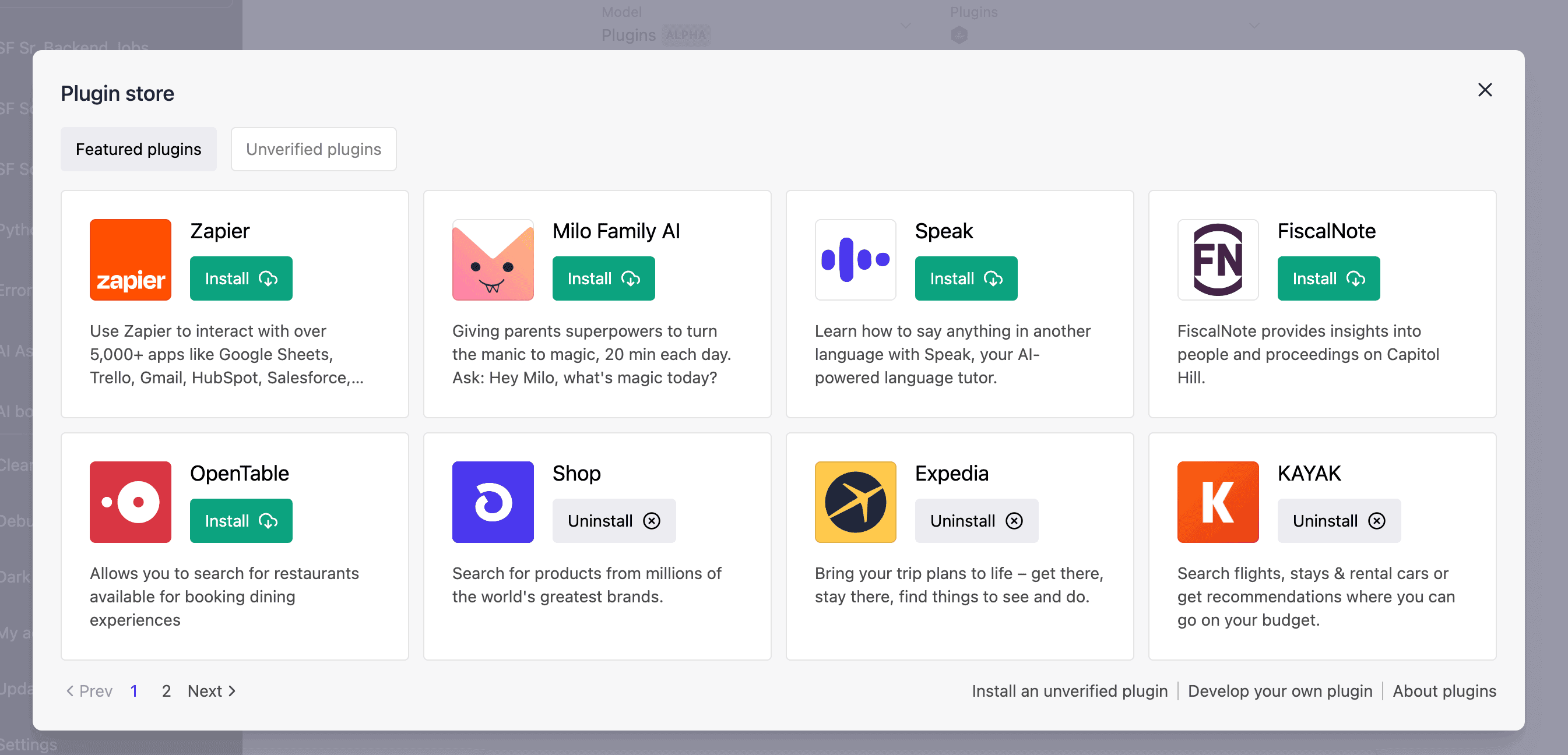ChatGPT, an AI chatbot created by OpenAI, is changing the world of chatbots by introducing a new App Store-inspired approach. This approach is opening up a vast universe of possibilities for both developers and users.
In recent times, there has been a lot of buzz around conversational agents and AI. Following the launch of GPT-4 in ChatGPT, OpenAI announced new third party plugins for ChatGPT. While some may view this as a minor development, it is actually a significant and promising development in the field.
ChatGPT’s Third-Party Plugin Store: Revolutionizing the World of AI Chatbots

These plugins provide access to third party knowledge sources, tools, and databases, including the web. They are available in alpha for ChatGPT waitlisted users and developers. And OpenAI plans to prioritize a small number of ChatGPT Plus developers and subscribers before rolling out wider access.
The most intriguing plugin is the web browsing plugin. Which allows ChatGPT to pull data from the web to answer various questions posed to it.
Without this plugin, ChatGPT’s knowledge has limitations to informabtion prior to around September 2021. However, with this plugin, ChatGPT can now fetch content from the web using the Bing Search API and display the websites it visited to craft an answer, citing its sources in ChatGPT answers. This is similar to the experience one can have on Microsoft’s Bing (based on GPT-4). But also on the future Google Bard.
While a chatbot with access to the web comes with risks, it also gives search engines a lot of power over the data that will feed the web connected language models. Therefore, it is likely that a specific set of rules will have to be established for plugin developers. Imposing certain restrictions and limits on them. In order to ensure the security and quality of the plugins offered on the ChatGPT platform.
OpenAI encourages developers to consult its documentation and API to design plugins for ChatGPT. Several partners such as Expedia, Instacart, Kayak, OpenTable, and Zapier have already created their own plugins.
With our new AI Plugin, a traveler can start a conversation with #ChatGPT to plan their next trip–complete with access to up-to-date information on the availability & price of flights, hotels, vacation rentals, activities, & car rentals across the world. https://t.co/cVgLL6qln9 pic.twitter.com/YAIaj9zrEd
— Expedia Group (@ExpediaGroup) March 23, 2023
By using the Expedia plugin, users can design a travel itinerary via chat with ChatGPT, based on travel data provided by Expedia. This includes real time availability and prices for flights, hotels, vacation rentals, activities, and car rentals.
This approach is similar to Apple’s App Store when it was introduced on the iPhone. As it transformed the way apps were developed and distributed. Similarly, by offering plugins for ChatGPT, OpenAI is creating an ecosystem where developers can design and share their own extensions. Improving user experience and opening up new possibilities for AI-powered chatbots.
Exploring the Potential Impact of Third-Party Plugins on ChatGPT’s Future

ChatGPT is a revolutionary AI-powered chatbot that has already made significant strides in the field of natural language processing. However, the integration of third party plugins could take this technology to the next level. Potentially revolutionizing the way we use ChatGPT and unlocking a whole new range of capabilities and features.
Third-party plugins have the potential to allow users to personalize their experience with the chatbot. Adding features and functions that are tailored to their specific needs and preferences. With the ability to add new conversation modes or language support, integrations with other apps or services, and more, users could have a more personalized and intuitive experience with ChatGPT.
One of the most significant benefits of third party plugins is that they could enhance ChatGPT’s ability to assist users with specific tasks or needs. For example, a plugin could be created that allows ChatGPT to provide more detailed and accurate information on a particular topic. Such as medical advice or financial planning. This could be especially useful for individuals who rely on ChatGPT for guidance and support in their daily lives.
In addition, third party plugins could help to increase the overall usefulness and adoption of ChatGPT. By allowing developers and users to create and share plugins, the chatbot could become more versatile and attractive to a wider range of users. This, in turn, could help to drive further innovation and development in the field of natural language processing.
However, there are also potential risks and drawbacks to consider when it comes to third-party plugins for ChatGPT. For example, plugins could have malicious intent, compromising the security and privacy of users’ data. Additionally, poorly designed or executed plugins could lead to a negative user experience or even potential harm.
Despite these risks, the potential benefits of third party plugins for ChatGPT are significant. By expanding the chatbot’s capabilities and enhancing its ability to assist users, plugins could help to unlock a whole new range of possibilities for this innovative technology. As such, it will be interesting to see how developers and users alike continue to explore and innovate in this area in the years to come.
As with any emerging technology, the future of ChatGPT with third party plugins is difficult to predict. However, it is clear that the potential benefits of such plugins are significant. And could help to take this already impressive chatbot to new heights. By letting users to personalize their experience and enhancing the chatbot’s ability to assist with specific tasks, third party plugins have the potential to revolutionize the way we use ChatGPT and the field of natural language processing as a whole. We hope that users will get the most benefit from the new ChatGPT feature. And it will be a great addition to boost their productivity.





